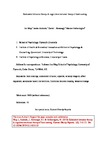Elaborated Intrusion theory: A cognitive-emotional theory of food craving
| dc.contributor.author | May, Jon | |
| dc.contributor.author | Andrade, Jackie | |
| dc.contributor.author | Kavanagh, D | |
| dc.contributor.author | Hetherington, M | |
| dc.date.accessioned | 2013-07-10T13:37:20Z | |
| dc.date.accessioned | 2013-07-10T13:37:51Z | |
| dc.date.accessioned | 2013-07-10T13:38:56Z | |
| dc.date.accessioned | 2013-07-10T13:43:27Z | |
| dc.date.available | 2013-07-10T13:37:20Z | |
| dc.date.available | 2013-07-10T13:37:51Z | |
| dc.date.available | 2013-07-10T13:38:56Z | |
| dc.date.available | 2013-07-10T13:43:27Z | |
| dc.date.issued | 2012-03 | |
| dc.identifier.issn | 2162-4968 | |
| dc.identifier.issn | 2162-4968 | |
| dc.identifier.uri | http://hdl.handle.net/10026.1/1565 | |
| dc.description.abstract |
A clear understanding of the cognitive-emotional processes underpinning desires to overconsume foods and adopt sedentary lifestyles can inform the development of more effective interventions to promote healthy eating and physical activity. The Elaborated Intrusion Theory of Desires offers a framework that can help in this endeavor through its emphases on the roles of intrusive thoughts and elaboration of multisensory imagery. There is now substantial evidence that tasks that compete for limited working memory resources with food-related imagery can reduce desires to eat that food, and that positive imagery can promote functional behavior. Meditation mindfulness can also short-circuit elaboration of dysfunctional cognition. Functional Decision Making is an approach that applies laboratory-based research on desire, to provide a motivational intervention to establish and entrench behavior changes, so healthy eating and physical activity become everyday habits. | |
| dc.format.extent | 114-121 | |
| dc.language | en | |
| dc.language.iso | en | |
| dc.publisher | Springer | |
| dc.relation.replaces | http://hdl.handle.net/10026.1/1562 | |
| dc.relation.replaces | 10026.1/1562 | |
| dc.relation.replaces | http://hdl.handle.net/10026.1/1563 | |
| dc.relation.replaces | 10026.1/1563 | |
| dc.relation.replaces | http://hdl.handle.net/10026.1/1564 | |
| dc.relation.replaces | 10026.1/1564 | |
| dc.subject | Neurosciences | |
| dc.subject | Clinical Research | |
| dc.subject | Obesity | |
| dc.subject | Prevention | |
| dc.subject | Nutrition | |
| dc.subject | Mind and Body | |
| dc.subject | Behavioral and Social Science | |
| dc.subject | Basic Behavioral and Social Science | |
| dc.title | Elaborated Intrusion theory: A cognitive-emotional theory of food craving | |
| dc.type | journal-article | |
| dc.type | Article | |
| plymouth.author-url | http://www.plymouth.ac.uk/staff/jmay1 | |
| plymouth.issue | 1 | |
| plymouth.volume | 2 | |
| plymouth.publication-status | Published | |
| plymouth.journal | Current Obesity Reports | |
| dc.identifier.doi | 10.1007/s13679-012-0010-2 | |
| plymouth.organisational-group | /Plymouth | |
| plymouth.organisational-group | /Plymouth/Admin Group - REF | |
| plymouth.organisational-group | /Plymouth/Admin Group - REF/REF Admin Group - FoH | |
| plymouth.organisational-group | /Plymouth/Faculty of Health | |
| plymouth.organisational-group | /Plymouth/Faculty of Health/School of Psychology | |
| plymouth.organisational-group | /Plymouth/REF 2021 Researchers by UoA | |
| plymouth.organisational-group | /Plymouth/REF 2021 Researchers by UoA/UoA04 Psychology, Psychiatry and Neuroscience | |
| plymouth.organisational-group | /Plymouth/REF 2021 Researchers by UoA/UoA04 Psychology, Psychiatry and Neuroscience/UoA04 REF peer reviewers | |
| plymouth.organisational-group | /Plymouth/Research Groups | |
| plymouth.organisational-group | /Plymouth/Research Groups/Centre for Brain, Cognition and Behaviour (CBCB) | |
| plymouth.organisational-group | /Plymouth/Research Groups/Centre for Brain, Cognition and Behaviour (CBCB)/Behaviour | |
| plymouth.organisational-group | /Plymouth/Research Groups/Centre for Brain, Cognition and Behaviour (CBCB)/Cognition | |
| plymouth.organisational-group | /Plymouth/Research Groups/Institute of Health and Community | |
| plymouth.organisational-group | /Plymouth/Research Groups/Plymouth Institute of Health and Care Research (PIHR) | |
| plymouth.organisational-group | /Plymouth/Users by role | |
| plymouth.organisational-group | /Plymouth/Users by role/Academics | |
| dc.identifier.eissn | 2162-4968 | |
| dc.rights.embargoperiod | Not known | |
| rioxxterms.versionofrecord | 10.1007/s13679-012-0010-2 | |
| rioxxterms.licenseref.uri | http://www.rioxx.net/licenses/all-rights-reserved | |
| rioxxterms.type | Journal Article/Review |


